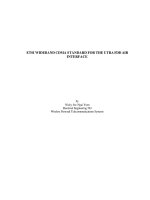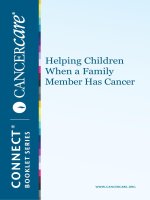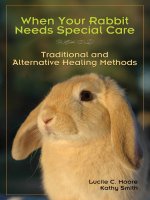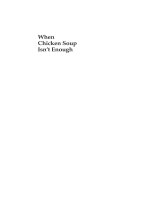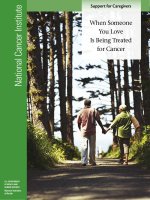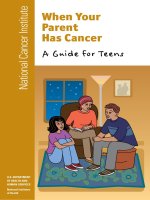When breath becomes air
Bạn đang xem bản rút gọn của tài liệu. Xem và tải ngay bản đầy đủ của tài liệu tại đây (891.07 KB, 96 trang )
WhenBreathBecomesAir
PaulKalanithi
RandomHousePublishingGroup(2016)
Copyright©2016byCorcovado,Inc.
Forewordcopyright©2016byAbrahamVerghese
Allrightsreserved.
PublishedintheUnitedStatesbyRandomHouse,animprintanddivisionofPenguinRandomHouseLLC,NewYork.
RANDOMHOUSEandtheHOUSEcolophonareregisteredtrademarksofPenguinRandomHouseLLC.
LibraryofCongressCataloging-in-PublicationData
Names:Kalanithi,Paul,author.
Title:Whenbreathbecomesair/PaulKalanithi;forewordbyAbrahamVerghese.
Description:NewYork:RandomHouse,2016.
Identifiers:LCCN2015023815|ISBN9780812988406(hardback)|ISBN9780812988413(ebook)
Subjects:LCSH:Kalanithi,Paul—Health.|Lungs—Cancer—Patients—UnitedStates—Biography.|Neurosurgeons—
Biography.|Husbandandwife.|BISAC:BIOGRAPHY&AUTOBIOGRAPHY/PersonalMemoirs.|MEDICAL/
General.|SOCIALSCIENCE/Death&Dying.
Classification:LCCRC280.L8K352016|DDC616.99/424—dc23LCrecordavailableat
/>eBookISBN 9780812988413
randomhousebooks.com
BookdesignbyLizCosgrove,adaptedforeBook
Coverdesign:RachelAke
v4.1
ep
Contents
Cover
TitlePage
Copyright
Editor’sNote
Epigraph
ForewordbyAbrahamVerghese
Prologue
PartI:InPerfectHealthIBegin
PartII:CeaseNottillDeath
EpiloguebyLucyKalanithi
Dedication
Acknowledgments
AbouttheAuthor
EVENTS DESCRIBED ARE BASED on Dr. Kalanithi’s memory of real-world situations.
However, the names of all patients discussed in this book—if given at all—have been
changed.Inaddition,ineachofthemedicalcasesdescribed,identifyingdetails—suchas
patients’ages,genders,ethnicities,professions,familialrelationships,placesofresidence,
medicalhistories,and/ordiagnoses—havebeenchanged.Withoneexception,thenames
of Dr. Kalanithi’s colleagues, friends, and treating physicians have also been changed.
Anyresemblancetopersonslivingordeadresultingfromchangestonamesoridentifying
detailsisentirelycoincidentalandunintentional.
Youthatseekwhatlifeisindeath,
Nowfinditairthatoncewasbreath.
Newnamesunknown,oldnamesgone:
Tilltimeendbodies,butsoulsnone.
Reader!thenmaketime,whileyoube,
Butstepstoyoureternity.
—BaronBrookeFulkeGreville,“Caelica83”
FOREWORD
AbrahamVerghese
ITOCCURSTOME, asIwritethis,thattheforewordtothisbookmightbebetterthoughtof
asanafterword.BecausewhenitcomestoPaulKalanithi,allsenseoftimeisturnedonits
head. To begin with—or, maybe, to end with—I got to know Paul only after his death.
(Bearwithme.)Icametoknowhimmostintimatelywhenhe’dceasedtobe.
I met him one memorable afternoon at Stanford in early February 2014. He’d just
publishedanop-edtitled“HowLongHaveIGotLeft?”inTheNewYorkTimes,anessay
that would elicit an overwhelming response, an outpouring from readers. In the ensuing
days,itspreadexponentially.(I’maninfectiousdiseasesspecialist,sopleaseforgiveme
fornotusingthewordviralasametaphor.)Intheaftermathofthat,he’daskedtocome
seeme,tochat,togetadviceaboutliteraryagents,editors,thepublishingprocess—hehad
adesiretowriteabook,thisbook,theoneyouarenowholdinginyourhands.Irecallthe
sun filtering through the magnolia tree outside my office and lighting this scene: Paul
seatedbeforeme,hisbeautifulhandsexceedinglystill,hisprophet’sbeardfull,thosedark
eyestakingthemeasureofme.Inmymemory,thepicturehasaVermeer-likequality,a
camera obscura sharpness. I remember thinking, You must remember this, because what
wasfallingonmyretinawasprecious.Andbecause,inthecontextofPaul’sdiagnosis,I
becameawareofnotjusthismortalitybutmyown.
Wetalkedaboutalotofthingsthatafternoon.Hewasaneurosurgicalchiefresident.
Wehadprobablycrossedpathsatsomepoint,butwehadn’tsharedapatientthatwecould
recall. He told me he had been an English and biology major as an undergraduate at
Stanford, and then stayed on for a master’s in English literature. We talked about his
lifelong love of writing and reading. I was struck by how easily he could have been an
Englishprofessor—and,indeed,hehadseemedtobeheadeddownthatpathatonepoint
inhislife.Butthen,justlikehisnamesakeontheroadtoDamascus,hefeltthecalling.He
becameaphysicianinstead,butonewhoalwaysdreamedofcomingbacktoliteraturein
someform.Abook,perhaps.Oneday.Hethoughthehadtime,andwhynot?Andyetnow
timewastheverythinghehadsolittleof.
Irememberhiswry,gentlesmile,ahintofmischiefthere,eventhoughhisfacewas
gauntandhaggard.He’dbeenthroughthewringerwiththiscancerbutanewbiological
therapyhadproducedagoodresponse,allowinghimtolookaheadabit.Hesaidduring
medicalschoolhe’dassumedthathewouldbecomeapsychiatrist,onlytofallinlovewith
neurosurgery. It was much more than a falling in love with the intricacies of the brain,
muchmorethanthesatisfactionoftraininghishandstoaccomplishamazingfeats—itwas
a love and empathy for those who suffered, for what they endured and what he might
bringtobear.Idon’tthinkhetoldmethisasmuchasIhadheardaboutthisqualityofhis
fromstudentsofminewhowerehisacolytes:hisfiercebeliefinthemoraldimensionof
hisjob.Andthenwetalkedabouthisdying.
Afterthatmeeting,wekeptintouchbyemail,butneversaweachotheragain.Itwas
notjustthatIdisappearedintomyownworldofdeadlinesandresponsibilitiesbutalsomy
strongsensethattheburdenwasonmetoberespectfulofhistime.ItwasuptoPaulifhe
wantedtoseeme.Ifeltthatthelastthingheneededwastheobligationtoserviceanew
friendship.Ithoughtabouthimalot,though,andabouthiswife.Iwantedtoaskhimifhe
waswriting.Washefindingthetime?Foryears,asabusyphysician,I’dstruggledtofind
the time to write. I wanted to tell him that a famous writer, commiserating about this
eternalproblem,oncesaidtome,“IfIwereaneurosurgeonandIannouncedthatIhadto
leavemygueststogoinforanemergencycraniotomy,noonewouldsayaword.ButifI
saidIneededtoleavetheguestsinthelivingroomtogoupstairstowrite…”Iwondered
ifPaulwouldhavefoundthisfunny.Afterall,hecouldactuallysayhewasgoingtodoa
craniotomy!Itwasplausible!Andthenhecouldgowriteinstead.
WhilePaulwaswritingthisbook,hepublishedashort,remarkableessayinStanford
Medicine, in an issue that was devoted to the idea of time. I had an essay in the same
issue, my piece juxtaposed to his, though I learned of his contribution only when the
magazine was in my hands. In reading his words, I had a second, deeper glimpse of
somethingofwhichtherehadbeenahintintheNewYorkTimesessay:Paul’swritingwas
simplystunning.Hecouldhavebeenwritingaboutanything,anditwouldhavebeenjust
aspowerful.Buthewasn’twritingaboutanything—hewaswritingabouttimeandwhatit
meanttohimnow,inthecontextofhisillness.Whichmadeitallsoincrediblypoignant.
Buthere’sthethingImustcomebackto:theprosewasunforgettable.Outofhispen
hewasspinninggold.
I reread Paul’s piece again and again, trying to understand what he had brought
about.First,itwasmusical.IthadechoesofGalwayKinnell,almostaprosepoem.(“If
onedayithappens/youfindyourselfwithsomeoneyoulove/inacaféatoneend/ofthe
PontMirabeau,atthezincbar/wherewinestandsinupwardopeningglasses…”toquote
a Kinnell line, from a poem I once heard him recite in a bookstore in Iowa City, never
lookingdownatthepaper.)Butitalsohadatasteofsomethingelse,somethingfroman
antiqueland,fromatimebeforezincbars.ItfinallycametomeafewdayslaterwhenI
picked up his essay yet again: Paul’s writing was reminiscent of Thomas Browne’s.
BrownehadwrittenReligioMediciintheproseof1642,withallitsarchaicspellingsand
speech.Asayoungphysician,Iwasobsessedwiththatbook,keptatitlikeafarmertrying
todrainabogthathisfatherbeforehimhadfailedtodrain.Itwasafutiletask,andyetI
wasdesperatetolearnitssecrets,tossingitasideinfrustration,thenpickingitupagain,
unsurethatithadanythingformebut,insoundingthewords,sensingthatitdid.Ifeltthat
Ilackedsomecriticalreceptorfortheletterstosing,toimparttheirmeaning.Itremained
opaque,nomatterhowhardItried.
Why,youask?WhydidIpersevere?WhocaresaboutReligioMedici?
Well, my hero William Osler cared, that’s who. Osler was the father of modern
medicine,amanwhodiedin1919.Hehadlovedthebook.Hekeptitonhisnightstand.
He’daskedtobeburiedwithacopyofReligioMedici.Forthelifeofme,Ididn’tgetwhat
Osler saw in it. After many tries—and after some decades—the book finally revealed
itselftome.(Ithelpedthatanewereditionhadmodernspellings.)Thetrick,Idiscovered,
wastoreaditaloud,whichmadethecadenceinescapable:“Wecarrywithusthewonders,
we seek without us: There is all Africa, and her prodigies in us; we are that bold and
adventurouspieceofnature,whichhethatstudies,wiselylearnsinacompendium,what
others labour at in a divided piece and endless volume.” When you come to the last
paragraphofPaul’sbook,readitaloudandyouwillhearthatsamelongline,thecadence
you think you can tap your feet to…but as with Browne, you will be just off. Paul, it
occurred to me, was Browne redux. (Or given that forward time is our illusion, perhaps
it’sthatBrownewasKalanithiredux.Yes,it’shead-spinningstuff.)
AndthenPauldied.IattendedhismemorialintheStanfordchurch,agorgeousspace
where I often go when it is empty to sit and admire the light, the silence, and where I
always find renewal. It was packed for the service. I sat off to one side, listening to a
series of moving and sometimes raucous stories from his closest friends, his pastor, and
hisbrother.Yes,Paulwasgone,butstrangely,IfeltIwascomingtoknowhim,beyond
thatvisitinmyoffice,beyondthefewessayshe’dwritten.Hewastakingforminthose
tales being told in the Stanford Memorial Church, its soaring cathedral dome a fitting
space in which to remember this man whose body was now in the earth but who
neverthelesswassopalpablyalive.Hetookformintheshapeofhislovelywifeandbaby
daughter, his grieving parents and siblings, in the faces of the legions of friends,
colleagues,andformerpatientswhofilledthatspace;hewasthereatthereceptionlater,
outdoorsinasettingwheresomanycametogether.Isawfaceslookingcalm,smiling,as
iftheyhadwitnessedsomethingprofoundlybeautifulinthechurch.Perhapsmyfacewas
likethat,too:wehadfoundmeaningintheritualofaservice,intheritualofeulogizing,in
thesharedtears.Therewasfurthermeaningresidinginthisreceptionwhereweslakedour
thirst, fed our bodies, and talked with complete strangers to whom we were intimately
connectedthroughPaul.
But it was only when I received the pages that you now hold in your hands, two
monthsafterPauldied,thatIfeltIhadfinallycometoknowhim,toknowhimbetterthan
ifIhadbeenblessedtocallhimafriend.Afterreadingthebookyouareabouttoread,I
confessIfeltinadequate:therewasanhonesty,atruthinthewritingthattookmybreath
away.
Be ready. Be seated. See what courage sounds like. See how brave it is to reveal
yourselfinthisway.Butaboveall,seewhatitistostilllive,toprofoundlyinfluencethe
lives of others after you are gone, by your words. In a world of asynchronous
communication, where we are so often buried in our screens, our gaze rooted to the
rectangularobjectsbuzzinginourhands,ourattentionconsumedbyephemera,stopand
experience this dialogue with my young departed colleague, now ageless and extant in
memory.ListentoPaul.Inthesilencesbetweenhiswords,listentowhatyouhavetosay
back.Thereinlieshismessage.Igotit.Ihopeyouexperienceit,too.Itisagift.Letme
notstandbetweenyouandPaul.
PROLOGUE
Websterwasmuchpossessedbydeath
Andsawtheskullbeneaththeskin;
Andbreastlesscreaturesunderground
Leanedbackwardwithaliplessgrin.
—T.S.Eliot,“WhispersofImmortality”
IFLIPPEDTHROUGHTHECTscanimages,thediagnosisobvious:thelungsweremattedwith
innumerable tumors, the spine deformed, a full lobe of the liver obliterated. Cancer,
widely disseminated. I was a neurosurgical resident entering my final year of training.
Over the last six years, I’d examined scores of such scans, on the off chance that some
proceduremightbenefitthepatient.Butthisscanwasdifferent:itwasmyown.
Iwasn’tintheradiologysuite,wearingmyscrubsandwhitecoat.Iwasdressedina
patient’sgown,tetheredtoanIVpole,usingthecomputerthenursehadleftinmyhospital
room,withmywife,Lucy,aninternist,atmyside.Iwentthrougheachsequenceagain:
thelungwindow,thebonewindow,theliverwindow,scrollingfromtoptobottom,then
left to right, then front to back, just as I had been trained to do, as if I might find
somethingthatwouldchangethediagnosis.
Welaytogetheronthehospitalbed.
Lucy,quietly,asifreadingfromascript:“Doyouthinkthere’sanypossibilitythat
it’ssomethingelse?”
“No,”Isaid.
Weheldeachothertightly,likeyounglovers.Inthepastyearwe’dbothsuspected,
butrefusedtobelieve,orevendiscuss,thatacancerwasgrowinginsideme.
Aboutsixmonthsbefore,Ihadstartedlosingweightandhavingferociousbackpain.
WhenIdressedinthemorning,mybeltcinchedone,thentwonotchestighter.Iwentto
seemyprimarycaredoctor,anoldclassmatefromStanford.Hersisterhaddiedsuddenly
as a neurosurgery intern, after contracting a virulent infection, and so she’d taken a
maternalwatchonmyhealth.WhenIarrived,however,Ifoundadifferentdoctorinher
office—myclassmatewasonmaternityleave.
Dressedinathinbluegownonacoldexaminingtable,Idescribedthesymptomsto
her. “Of course,” I said, “if this were a boards exam question—thirty-five-year-old with
unexplained weight loss and new-onset back pain—the obvious answer would be (C)
cancer.Butmaybeit’sjustthatI’mworkingtoohard.Idon’tknow.I’dliketogetanMRI
tobesure.”
“IthinkweshouldgetX-raysfirst,”shesaid.MRIsforbackpainareexpensive,and
unnecessary imaging had lately become a major national point of cost-saving emphasis.
But the value of a scan also depends on what you are looking for: X-rays are largely
useless for cancer. Still, for many docs, ordering an MRI at this early stage is apostasy.
Shecontinued:“X-raysaren’tperfectlysensitive,butitmakessensetostartthere.”
“How about we get flexion-extension X-rays, then—maybe the more realistic
diagnosishereisisthmicspondylolisthesis?”
Fromthereflectioninthewallmirror,Icouldseehergooglingit.
“It’s a pars fracture affecting up to five percent of people and a frequent cause of
backpainintheyoung.”
“Okay,I’llorderthem,then.”
“Thanks,”Isaid.
WhywasIsoauthoritativeinasurgeon’scoatbutsomeekinapatient’sgown?The
truth was, I knew more about back pain than she did—half of my training as a
neurosurgeonhadinvolveddisordersofthespine.Butmaybeaspondywasmorelikely.It
didaffectasignificantpercentofyoungadults—andcancerinthespineinyourthirties?
Theoddsofthatcouldn’tbemorethanoneintenthousand.Evenifitwereonehundred
timesmorecommonthanthat,it’dstillbelesscommonthanaspondy.MaybeIwasjust
freakingmyselfout.
The X-rays looked fine. We chalked the symptoms up to hard work and an aging
body, scheduled a follow-up appointment, and I went back to finish my last case of the
day. The weight loss slowed, and the back pain became tolerable. A healthy dose of
ibuprofengotmethroughtheday,andafterall,thereweren’tthatmanyofthesegrueling,
fourteen-hour days left. My journey from medical student to professor of neurosurgery
wasalmostcomplete:aftertenyearsofrelentlesstraining,Iwasdeterminedtopersevere
forthenextfifteenmonths,untilresidencyended.Ihadearnedtherespectofmyseniors,
won prestigious national awards, and was fielding job offers from several major
universities.MyprogramdirectoratStanfordhadrecentlysatmedownandsaid,“Paul,I
thinkyou’llbethenumberonecandidateforanyjobyouapplyfor.JustasanFYI:we’ll
be starting a faculty search for someone like you here. No promises, of course, but it’s
somethingyoushouldconsider.”
Atagethirty-six,Ihadreachedthemountaintop;IcouldseethePromisedLand,from
GileadtoJerichototheMediterraneanSea.Icouldseeanicecatamaranonthatseathat
Lucy,ourhypotheticalchildren,andIwouldtakeoutonweekends.Icouldseethetension
in my back unwinding as my work schedule eased and life became more manageable. I
couldseemyselffinallybecomingthehusbandI’dpromisedtobe.
Then, a few weeks later, I began having bouts of severe chest pain. Had I bumped
into something at work? Cracked a rib somehow? Some nights, I’d wake up on soaked
sheets,drippingsweat.Myweightbegandroppingagain,morerapidlynow,from175to
145 pounds. I developed a persistent cough. Little doubt remained. One Saturday
afternoon,LucyandIwerelyinginthesuninDoloresParkinSanFrancisco,waitingto
meethersister.Sheglimpsedmyphonescreen,whichdisplayedmedicaldatabasesearch
results:“frequencyofcancersinthirty-toforty-year-olds.”
“What?”shesaid.“Ididn’trealizeyouwereactuallyworriedaboutthis.”
Ididn’trespond.Ididn’tknowwhattosay.
“Doyouwanttotellmeaboutit?”sheasked.
Shewasupsetbecauseshehadbeenworriedaboutit,too.ShewasupsetbecauseI
wasn’ttalkingtoheraboutit.ShewasupsetbecauseI’dpromisedheronelife,andgiven
heranother.
“Canyoupleasetellmewhyyouaren’tconfidinginme?”sheasked.
Iturnedoffmyphone.“Let’sgetsomeicecream,”Isaid.
—
Wewerescheduledforavacationthefollowingweektovisitsomeoldcollegefriendsin
NewYork.Maybeagoodnight’ssleepandafewcocktailswouldhelpusreconnectabit
anddecompressthepressurecookerofourmarriage.
ButLucyhadanotherplan.“I’mnotcomingtoNewYorkwithyou,”sheannounced
a few days before the trip. She was going to move out for a week; she wanted time to
consider the state of our marriage. She spoke in even tones, which only heightened the
vertigoIfelt.
“What?”Isaid.“No.”
“Iloveyousomuch,whichiswhythisissoconfusing,”shesaid.“ButI’mworried
wewantdifferentthingsfromourrelationship.Ifeellikewe’reconnectedhalfway.Idon’t
wanttolearnaboutyourworriesbyaccident.WhenItalktoyouaboutfeelingisolated,
youdon’tseemtothinkit’saproblem.Ineedtodosomethingdifferent.”
“Thingsaregoingtobeokay,”Isaid.“It’sjustresidency.”
Were things really so bad? Neurosurgical training, among the most rigorous and
demandingofallmedicalspecialties,hadsurelyputastrainonourmarriage.Therewere
so many nights when I came home late from work, after Lucy had gone to bed, and
collapsedonthelivingroomfloor,exhausted,andsomanymorningswhenIleftforwork
in the early dark, before she’d awoken. But our careers were peaking now—most
universities wanted both of us: me in neurosurgery, Lucy in internal medicine. We’d
survivedthemostdifficultpartofourjourney.Hadn’twediscussedthisadozentimes?
Didn’tsherealizethiswastheworstpossibletimeforhertoblowthingsup?Didn’tshe
seethatIhadonlyoneyearleftinresidency,thatIlovedher,thatweweresoclosetothe
lifetogetherwe’dalwayswanted?
“Ifitwerejustresidency,Icouldmakeit,”shesaid.“We’vemadeitthisfar.Butthe
problemis,whatifit’snotjustresidency?Doyoureallythinkthingswillbebetterwhen
you’reanacademicneurosurgeryattending?”
I offered to skip the trip, to be more open, to see the couples therapist Lucy had
suggestedafewmonthsago,butsheinsistedthatsheneededtime—alone.Atthatpoint,
the fuzziness of the confusion dissipated, leaving only a hard edge. Fine, I said. If she
decidedtoleave,thenIwouldassumetherelationshipwasover.IfitturnedoutthatIhad
cancer,Iwouldn’ttellher—she’dbefreetolivewhateverlifeshechose.
BeforeleavingforNewYork,Isnuckinafewmedicalappointmentstoruleoutsome
common cancers in the young. (Testicular? No. Melanoma? No. Leukemia? No.) The
neurosurgicalservicewasbusy,asalways.ThursdaynightslippedintoFridaymorningas
I was caught in the operating room for thirty-six hours straight, in a series of deeply
complex cases: giant aneurysms, intracerebral arterial bypasses, arteriovenous
malformations.Ibreathedasilentthankswhentheattendingcamein,allowingmeafew
minutestoeasemybackagainstawall.TheonlytimetogetachestX-raywasasIwas
leavingthehospital,onthewayhomebeforeheadingtotheairport.IfiguredeitherIhad
cancer, in which case this might be the last time I would see my friends, or I didn’t, in
whichcasetherewasnoreasontocancelthetrip.
I rushed home to grab my bags. Lucy drove me to the airport and told me she had
scheduledusintocouplestherapy.
Fromthegate,Isentheratextmessage:“Iwishyouwerehere.”
Afewminuteslater,theresponsecameback:“Iloveyou.Iwillbeherewhenyouget
back.”
My back stiffened terribly during the flight, and by the time I made it to Grand
Centraltocatchatraintomyfriends’placeupstate,mybodywasripplingwithpain.Over
thepastfewmonths,I’dhadbackspasmsofvaryingferocity,fromsimpleignorablepain,
topainthatmademeforsakespeechtogrindmyteeth,topainsosevereIcurleduponthe
floor,screaming.Thispainwastowardthemoresevereendofthespectrum.Ilaydown
onahardbenchinthewaitingarea,feelingmybackmusclescontort,breathingtocontrol
thepain—theibuprofenwasn’ttouchingthis—andnamingeachmuscleasitspasmedto
staveofftears:erectorspinae,rhomboid,latissimus,piriformis…
Asecurityguardapproached.“Sir,youcan’tliedownhere.”
“I’msorry,”Isaid,gaspingoutthewords.“Bad…back…spasms.”
“Youstillcan’tliedownhere.”
I’msorry,butI’mdyingfromcancer.
Thewordslingeredonmytongue—butwhatifIwasn’t?Maybethiswasjustwhat
peoplewithbackpainlivewith.Iknewalotaboutbackpain—itsanatomy,itsphysiology,
the different words patients used to describe different kinds of pain—but I didn’t know
whatitfeltlike.Maybethat’sallthiswas.Maybe.OrmaybeIdidn’twantthejinx.Maybe
Ijustdidn’twanttosaythewordcanceroutloud.
Ipulledmyselfupandhobbledtotheplatform.
ItwaslateafternoonwhenIreachedthehouseinColdSpring,fiftymilesnorthof
ManhattanontheHudsonRiver,andwasgreetedbyadozenofmyclosestfriendsfrom
yearspast,theircheersofwelcomemixedwiththecacophonyofyoung,happychildren.
Hugsensued,andanice-colddarkandstormymadeitswaytomyhand.
“NoLucy?”
“Suddenworkthing,”Isaid.“Verylast-minute.”
“Oh,whatabummer!”
“Say,doyoumindifIputmybagsdownandrestabit?”
IhadhopedafewdaysoutoftheOR,withadequatesleep,rest,andrelaxation—in
short,atasteofanormallife—wouldbringmysymptomsbackintothenormalspectrum
forbackpainandfatigue.Butafteradayortwo,itwascleartherewouldbenoreprieve.
Isleptthroughbreakfastsandshambledtothelunchtabletostareatampleplatesof
cassoulet and crab legs that I couldn’t bring myself to eat. By dinner, I was exhausted,
readyforbedagain.SometimesIreadtothekids,butmostlytheyplayedonandaround
me,leapingandyelling.(“Kids,IthinkUnclePaulneedsarest.Whydon’tyouplayover
there?”)Irememberedadayoffasasummercampcounselor,fifteenyearsprior,sitting
ontheshoreofalakeinNorthernCalifornia,withabunchofjoyouskidsusingmeasan
obstacleinaconvolutedgameofCapturetheFlag,whileIreadabookcalledDeathand
Philosophy. I used to laugh at the incongruities of that moment: a twenty-year-old amid
the splendor of trees, lake, mountains, the chirping of birds mixed with the squeal of
happyfour-year-olds,hisnoseburiedinasmallblackbookaboutdeath.Onlynow,inthis
moment,Ifelttheparallels:insteadofLakeTahoe,itwastheHudsonRiver;thechildren
werenotstrangers’,butmyfriends’;insteadofabookondeathseparatingmefromthe
lifearoundme,itwasmyownbody,dying.
Onthethirdnight,IspoketoMike,ourhost,totellhimIwasgoingtocutthetrip
shortandheadhomethenextday.
“Youdon’tlooksogreat,”hesaid.“Everythingokay?”
“Whydon’twegrabsomescotchandhaveaseat?”Isaid.
Infrontofhisfireplace,Isaid,“Mike,IthinkIhavecancer.Andnotthegoodkind,
either.”
ItwasthefirsttimeI’dsaiditoutloud.
“Okay,”hesaid.“Itakeitthisisnotsomeelaboratepracticaljoke?”
“No.”
Hepaused.“Idon’tknowexactlywhattoask.”
“Well,Isuppose,first,IshouldsaythatIdon’tknowforafactthatIhavecancer.I’m
just pretty sure of it—a lot of the symptoms point that way. I’m going to go home
tomorrowandsortitout.Hopefully,I’mwrong.”
Mike offered to take my luggage and send it home by mail, so I wouldn’t have to
carryitwithme.Hedrovemetotheairportearlythenextmorning,andsixhourslaterI
landedinSanFrancisco.MyphonerangasIsteppedofftheplane.Itwasmyprimarycare
doctor,callingwiththechestX-rayresult:mylungs,insteadofbeingclear,lookedblurry,
asifthecameraaperturehadbeenleftopentoolong.Thedoctorsaidshewasn’tsurewhat
thatmeant.
Shelikelyknewwhatitmeant.
Iknew.
Lucypickedmeupfromtheairport,butIwaiteduntilwewerehometotellher.We
satonthecouch,andwhenItoldher,sheknew.Sheleanedherheadonmyshoulder,and
thedistancebetweenusvanished.
“Ineedyou,”Iwhispered.
“Iwillneverleaveyou,”shesaid.
We called a close friend, one of the attending neurosurgeons at the hospital, and
askedhimtoadmitme.
I received the plastic arm bracelet all patients wear, put on the familiar light blue
hospitalgown,walkedpastthenursesIknewbyname,andwascheckedintoaroom—
thesameroomwhereIhadseenhundredsofpatientsovertheyears.Inthisroom,Ihad
satwithpatientsandexplainedterminaldiagnosesandcomplexoperations;inthisroom,I
hadcongratulatedpatientsonbeingcuredofadiseaseandseentheirhappinessatbeing
returnedtotheirlives;inthisroom,Ihadpronouncedpatientsdead.Ihadsatinthechairs,
washed my hands in the sink, scrawled instructions on the marker board, changed the
calendar.Ihadeven,inmomentsofutterexhaustion,longedtoliedowninthisbedand
sleep.NowIlaythere,wideawake.
Ayoungnurse,oneIhadn’tmet,pokedherheadin.
“Thedoctorwillbeinsoon.”
And with that, the future I had imagined, the one just about to be realized, the
culminationofdecadesofstriving,evaporated.
PARTI
InPerfectHealthIBegin
ThehandoftheLORDwasuponme,andcarriedmeoutinthespiritoftheLORD,andsetmedowninthemidst
ofthevalleywhichwasfullofbones,
Andcausedmetopassbythemroundabout:and,behold,therewereverymanyintheopenvalley;and,lo,they
wereverydry.
Andhesaiduntome,Sonofman,cantheseboneslive?
—Ezekiel37:1–3,KingJamestranslation
IKNEWWITHCERTAINTY thatIwouldneverbeadoctor.Istretchedoutinthesun,relaxing
onadesertplateaujustaboveourhouse.Myuncle,adoctor,likesomanyofmyrelatives,
hadaskedmeearlierthatdaywhatIplannedondoingforacareer,nowthatIwasheading
off to college, and the question barely registered. If you had forced me to answer, I
supposeIwouldhavesaidawriter,butfrankly,thoughtsofanycareeratthispointseemed
absurd.IwasleavingthissmallArizonatowninafewweeks,andIfeltlesslikesomeone
preparing to climb a career ladder than a buzzing electron about to achieve escape
velocity,flingingoutintoastrangeandsparklinguniverse.
Ilaythereinthedirt,awashinsunlightandmemory,feelingtheshrinkingsizeofthis
townoffifteenthousand,sixhundredmilesfrommynewcollegedormitoryatStanford
andallitspromise.
Iknewmedicineonlybyitsabsence—specifically,theabsenceofafathergrowing
up, one who went to work before dawn and returned in the dark to a plate of reheated
dinner.WhenIwasten,myfatherhadmovedus—threeboys,agesfourteen,ten,andeight
—from Bronxville, New York, a compact, affluent suburb just north of Manhattan, to
Kingman,Arizona,inadesertvalleyringedbytwomountainranges,knownprimarilyto
theoutsideworldasaplacetogetgasenroutetosomewhereelse.Hewasdrawnbythe
sun,bythecostofliving—howelsewouldhepayforhissonstoattendthecollegeshe
aspiredto?—andbytheopportunitytoestablisharegionalcardiologypracticeofhisown.
His unyielding dedication to his patients soon made him a respected member of the
community.Whenwedidseehim,lateatnightoronweekends,hewasanamalgamof
sweet affections and austere diktats, hugs and kisses mixed with stony pronouncements:
“It’s very easy to be number one: find the guy who is number one, and score one point
higherthanhedoes.”Hehadreachedsomecompromiseinhismindthatfatherhoodcould
be distilled; short, concentrated (but sincere) bursts of high intensity could equal…
whateveritwasthatotherfathersdid.AllIknewwas,ifthatwasthepriceofmedicine,it
wassimplytoohigh.
Frommydesertplateau,Icouldseeourhouse,justbeyondthecitylimits,atthebase
oftheCerbatMountains,amidred-rockdesertspeckledwithmesquite,tumbleweeds,and
paddle-shapedcacti.Outhere,dustdevilsswirledupfromnothing,blurringyourvision,
then disappeared. Spaces stretched on, then fell away into the distance. Our two dogs,
MaxandNip,nevergrewtiredofthefreedom.Everyday,they’dventureforthandbring
homesomenewdeserttreasure:thelegofadeer,unfinishedbitsofjackrabbittoeatlater,
thesun-bleachedskullofahorse,thejawboneofacoyote.
My friends and I loved the freedom, too, and we spent our afternoons exploring,
walking,scavengingforbonesandraredesertcreeks.Havingspentmypreviousyearsina
lightlyforestedsuburbintheNortheast,withatree-linedmainstreetandacandystore,I
foundthewild,windydesertalienandalluring.Onmyfirsttrekalone,asaten-year-old,I
discoveredanoldirrigationgrate.Iprieditopenwithmyfingers,lifteditup,andthere,a
fewinchesfrommyface,werethreewhitesilkenwebs,andineach,marchingalongon
spindledlegs,wasaglisteningblackbulbousbody,bearinginitsshinethedreadedbloodredhourglass.Neartoeachspiderapale,pulsatingsacbreathedwiththeimminentbirth
of countless more black widows. Horror let the grate crash shut. I stumbled back. The
horrorcameinamixof“countryfacts”(Nothingismoredeadlythanthebiteoftheblack
widowspider)andtheinhumanpostureandtheblackshineandtheredhourglass.Ihad
nightmaresforyears.
The desert offered a pantheon of terrors: tarantulas, wolf spiders, fiddlebacks, bark
scorpions, whip scorpions, centipedes, diamondbacks, sidewinders, Mojave greens.
Eventually we grew familiar, even comfortable, with these creatures. For fun, when my
friends and I discovered a wolf spider’s nest, we’d drop an ant onto its outer limits and
watchasitsentangledescapeattemptssentquiversdownthesilkstrands,intothespider’s
dark central hole, anticipating that fatal moment when the spider would burst from its
hollowsandseizethedoomedantinitsmandibles.“Countryfacts”becamemytermfor
the rural cousin of the urban legend. As I first learned them, country facts granted fairy
powerstodesertcreatures,making,say,theGilamonsternolessanactualmonsterthan
theGorgon.Onlyafterlivingoutinthedesertforawhiledidwerealizethatsomecountry
facts,liketheexistenceofthejackalope,hadbeendeliberatelycreatedtoconfusecityfolk
andamusethelocals.Ioncespentanhourconvincingagroupofexchangestudentsfrom
Berlinthat,yes,therewasaparticularspeciesofcoyotethatlivedinsidecactiandcould
leaptenyardstoattackitsprey(like,well,unsuspectingGermans).Yetnooneprecisely
knew where the truth lay amid the whirling sand; for every country fact that seemed
preposterous, there was one that felt solid and true. Always check your shoes for
scorpions,forexample,seemedplaingoodsense.
WhenIwassixteen,Iwassupposedtodrivemyyoungerbrother,Jeevan,toschool.
Onemorning,asusual,Iwasrunninglate,andasJeevanwasstandingimpatientlyinthe
foyer,yellingthathedidn’twanttogetdetentionagainbecauseofmytardiness,socouldI
pleasehurrythehellup,Iraceddownthestairs,threwopenthefrontdoor…andnearly
steppedonasnoozingsix-footrattlesnake.Itwasanothercountryfactthatifyoukilleda
rattlesnakeonyourdoorstep,itsmateandoffspringwouldcomeandmakeapermanent
nestthere,likeGrendel’smotherseekingherrevenge.SoJeevanandIdrewstraws:the
lucky one grabbed a shovel, the unlucky one a pair of thick gardening gloves and a
pillowcase, and through a seriocomic dance, we managed to get the snake into the
pillowcase.Then,likeanOlympichammerthrower,Ihurledthewholeoutintothedesert,
withplanstoretrievethepillowcaselaterthatafternoon,soasnottogetintroublewith
ourmother.
—
Ofourmanychildhoodmysteries,chiefamongthemwasnotwhyourfatherdecidedto
bringhisfamilytothedeserttownofKingman,Arizona,whichwegrewtocherish,but
howheeverconvincedmymothertojoinhimthere.Theyhadeloped,inlove,acrossthe
world,fromsouthernIndiatoNewYorkCity(heaChristian,sheaHindu,theirmarriage
was condemned on both sides, and led to years of familial rifts—my mother’s mother
never acknowledged my name, Paul, instead insisting I be called by my middle name,
Sudhir)toArizona,wheremymotherwasforcedtoconfrontanintractablemortalfearof
snakes.Eventhesmallest,cutest,mostharmlessredracerwouldsendherscreaminginto
the house, where she’d lock the doors and arm herself with the nearest large, sharp
implement—rake,cleaver,ax.
Thesnakeswereaconstantsourceofanxiety,butitwasherchildren’sfuturethatmy
mother feared for most of all. Before we moved, my older brother, Suman, had nearly
completedhighschoolinWestchesterCounty,whereelitecollegesweretheexpectation.
He was accepted to Stanford shortly after arriving in Kingman and left the house soon
thereafter. But Kingman, we learned, was not Westchester. As my mother surveyed the
Mohave County public school system, she became distraught. The U.S. census had
recently identified Kingman as the least educated district in America. The high school
dropout rate was somewhere north of 30 percent. Few students went on to college, and
certainly none to Harvard, my father’s standard of excellence. Looking for advice, my
mothercalledherfriendsandrelativesfromwealthyEastCoastsuburbsandfoundsome
sympathetic,othersgleefulthattheirchildrennolongerhadtocompetewiththesuddenly
education-starvedKalanithis.
At night, she broke into tears, sobbing alone in her bed. My mother, afraid the
impoverished school system would hobble her children, acquired, from somewhere, a
“collegeprepreadinglist.”TrainedinIndiatobeaphysiologist,marriedattwenty-three,
and preoccupied with raising three kids in a country that was not her own, she had not
read many of the books on the list herself. But she would make sure her kids were not
deprived.Shemademeread1984whenIwastenyearsold;Iwasscandalizedbythesex,
butitalsoinstilledinmeadeeploveof,andcarefor,language.
Endlessbooksandauthorsfollowed,asweworkedourwaymethodicallydownthe
list:TheCountofMonteCristo,EdgarAllanPoe,RobinsonCrusoe,Ivanhoe,Gogol,The
LastoftheMohicans,Dickens,Twain,Austen,BillyBudd…BythetimeIwastwelve,I
waspickingthemoutmyself,andmybrotherSumanwassendingmethebookshehad
readincollege:ThePrince,DonQuixote,Candide,LeMorteD’Arthur,Beowulf,Thoreau,
Sartre, Camus. Some left more of a mark than others. Brave New World founded my
nascent moral philosophy and became the subject of my college admissions essay, in
whichIarguedthathappinesswasnotthepointoflife.Hamletboremeathousandtimes
throughtheusualadolescentcrises.“ToHisCoyMistress”andotherromanticpoemsled
me and my friends on various joyful misadventures throughout high school—we often
sneaked out at night to, for example, sing “American Pie” beneath the window of the
captain of the cheerleading team. (Her father was a local minister and so, we reasoned,
less likely to shoot.) After I was caught returning at dawn from one such late-night
escapade,myworriedmotherthoroughlyinterrogatedmeregardingeverydrugteenagers
take, never suspecting that the most intoxicating thing I’d experienced, by far, was the
volumeofromanticpoetryshe’dhandedmethepreviousweek.Booksbecamemyclosest
confidants,finelygroundlensesprovidingnewviewsoftheworld.
Inherquesttoseethatherchildrenwereeducated,mymomdroveusmorethana
hundredmilesnorth,tothenearestbigcity,LasVegas,sowecouldtakeourPSATs,SATs,
andACTs.Shejoinedtheschoolboard,ralliedteachers,anddemandedthatAPclassesbe
added to the curriculum. She was a phenom: she took it upon herself to transform the
Kingmanschoolsystem,andshedid.Suddenlytherewasafeelinginourhighschoolthat
thetwomountainrangesthatboundedthetownnolongerdefinedthehorizon:itwaswhat
laybeyondthem.
Senior year, my close friend Leo, our salutatorian and the poorest kid I knew, was
advisedbytheschoolguidancecounselor,“You’resmart—youshouldjointhearmy.”
Hetoldmeaboutitafterward.“Fuckthat,”hesaid.“Ifyou’regoingtoHarvard,or
Yale,orStanford,thenIam,too.”
Idon’tknowifIwashappierwhenIgotintoStanfordorwhenLeogotintoYale.
Summer passed, and since Stanford began classes a month later than every other
school,allofmyfriendsscattered,leavingmebehind.Mostafternoons,I’dtrekintothe
desertaloneandnapandthinkuntilmygirlfriend,Abigail,gotoffhershiftatKingman’s
lone coffee shop. The desert offered a shortcut, through the mountains and down into
town,andhikingwasmorefunthandriving.Abigailwasinherearlytwenties,astudentat
ScrippsCollegewho,wantingtoavoidloans,wastakingasemesterofftostockpiletuition
money.Iwastakenwithherworldliness,thesensethatsheknewsecretsoneonlylearned
atcollege—shehadstudiedpsychology!—andwe’doftenmeetasshegotoffwork.She
was a harbinger of the subrosa, the new world awaiting me in just a few weeks. One
afternoon, I woke from my nap, looked up, and saw vultures circling, mistaking me for
carrion.Icheckedmywatch;itwasalmostthree.Iwasgoingtobelate.Idustedoffmy
jeansandjoggedtherestofthewaythroughthedesert,untilsandgavewaytopavement,
the first buildings appeared, and I rounded the corner to find Abigail, broom in hand,
sweepingthecoffeeshopdeck.
“Ialreadycleanedtheespressomachine,”shesaid,“sonoicedlatteforyoutoday.”
Thefloorsswept,wewentinside.Abigailwalkedtothecashregisterandpickedupa
paperbackshe’dstashedthere.“Here,”shesaid,tossingitatme.“Youshouldreadthis.
You’realwaysreadingsuchhigh-culturecrap—whydon’tyoutrysomethinglowbrowfor
once?”
Itwasafive-hundred-pagenovelcalledSatan:HisPsychotherapyandCurebythe
UnfortunateDr.Kassler,J.S.P.S.,byJeremyLeven.Itookithomeandreaditinaday.It
wasn’t high culture. It should have been funny, but it wasn’t. However, it did make the
throwawayassumptionthatthemindwassimplytheoperationofthebrain,anideathat
struckmewithforce;itstartledmynaïveunderstandingoftheworld.Ofcourse,itmust
betrue—whatwereourbrainsdoing,otherwise?Thoughwehadfreewill,wewerealso
biological organisms—the brain was an organ, subject to all the laws of physics, too!
Literatureprovidedarichaccountofhumanmeaning;thebrain,then,wasthemachinery
thatsomehowenabledit.Itseemedlikemagic.Thatnight,inmyroom,Iopenedupmy
red Stanford course catalog, which I had read through dozens of times, and grabbed a
highlighter. In addition to all the literature classes I had marked, I began looking in
biologyandneuroscienceaswell.
—
A few years later, I hadn’t thought much more about a career but had nearly completed
degreesinEnglishliteratureandhumanbiology.Iwasdrivenlessbyachievementthanby
tryingtounderstand,inearnest:Whatmakeshumanlifemeaningful?Istillfeltliterature
providedthebestaccountofthelifeofthemind,whileneurosciencelaiddownthemost
elegant rules of the brain. Meaning, while a slippery concept, seemed inextricable from
humanrelationshipsandmoralvalues.T.S.Eliot’sTheWasteLandresonatedprofoundly,
relating meaninglessness and isolation, and the desperate quest for human connection. I
foundEliot’smetaphorsleakingintomyownlanguage.Otherauthorsresonatedaswell.
Nabokov, for his awareness of how our suffering can make us callous to the obvious
sufferingofanother.Conrad,forhishypertunedsenseofhowmiscommunicationbetween
people can so profoundly impact their lives. Literature not only illuminated another’s
experience, it provided, I believed, the richest material for moral reflection. My brief
forays into the formal ethics of analytic philosophy felt dry as a bone, missing the
messinessandweightofrealhumanlife.
Throughoutcollege,mymonastic,scholarlystudyofhumanmeaningwouldconflict
withmyurgetoforgeandstrengthenthehumanrelationshipsthatformedthatmeaning.If
theunexaminedlifewasnotworthliving,wastheunlivedlifeworthexamining?Heading
into my sophomore summer, I applied for two jobs: as an intern at the highly scientific
YerkesPrimateResearchCenter,inAtlanta,andasaprepchefatSierraCamp,afamily
vacationspotforStanfordalumnionthepristineshoresofFallenLeafLake,abuttingthe
starkbeautyofDesolationWildernessinEldoradoNationalForest.Thecamp’sliterature
promised, simply, the best summer of your life. I was surprised and flattered to be
accepted. Yet I had just learned that macaques had a rudimentary form of culture, and I
waseagertogotoYerkesandseewhatcouldbethenaturaloriginofmeaningitself.In
otherwords,IcouldeitherstudymeaningorIcouldexperienceit.
Afterdelayingforaslongaspossible,Ifinallychosethecamp.Afterward,Idropped
bymybiologyadviser’sofficetoinformhimofmydecision.WhenIwalkedin,hewas
sittingathisdesk,headinajournal,asusual.Hewasaquiet,amiablemanwithheavylidded eyes, but as I told him my plans, he became a different person entirely: his eyes
shotopen,andhisfaceflushedred,flecksofspitspraying.
“What?”hesaid.“Whenyougrowup,areyougoingtobeascientistora…chef?”
Eventually the term ended and I was on the windy mountain road to camp, still
slightlyworriedthatI’dmadeawrongturninlife.Mydoubt,however,wasshort-lived.
Thecampdeliveredonitspromise,concentratingalltheidyllsofyouth:beautymanifest
in lakes, mountains, people; richness in experience, conversation, friendships. Nights
duringafullmoon,thelightfloodedthewilderness,soitwaspossibletohikewithouta
headlamp.Wewouldhitthetrailattwo A.M.,summitingthenearestpeak,MountTallac,
justbeforesunrise,theclear,starrynightreflectedintheflat,stilllakesspreadbelowus.
Snuggledtogetherinsleepingbagsatthepeak,nearlytenthousandfeetup,weweathered
frigidblastsofwindwithcoffeesomeonehadbeenthoughtfulenoughtobring.Andthen
wewouldsitandwatchasthefirsthintofsunlight,alighttingeofdayblue,wouldleak
outoftheeasternhorizon,slowlyerasingthestars.Thedayskywouldspreadwideand
high,untilthefirstrayofthesunmadeanappearance.Themorningcommutersbeganto
animatethedistantSouthLakeTahoeroads.Butcraningyourheadback,youcouldsee
the day’s blue darken halfway across the sky, and to the west, the night remained yet
unconquered—pitch-black,starsinfullglimmer,thefullmoonstillpinnedinthesky.To
theeast,thefulllightofdaybeamedtowardyou;tothewest,nightreignedwithnohintof
surrender.Nophilosophercanexplainthesublimebetterthanthis,standingbetweenday
andnight.ItwasasifthiswerethemomentGodsaid,“Lettherebelight!”Youcouldnot
help but feel your specklike existence against the immensity of the mountain, the earth,
theuniverse,andyetstillfeelyourowntwofeetonthetalus,reaffirmingyourpresence
amidthegrandeur.
This was summer at Sierra Camp, perhaps no different from any other camp, but
every day felt full of life, and of the relationships that give life meaning. Other nights
foundagroupofusonthediningroomdeck,sippingwhiskeywiththeassistantdirector
of the camp, Mo, a Stanford alum taking a break from his English PhD, and discussing
literatureandtheweightymattersofpostadolescentlife.Thenextyearhereturnedtohis
PhD,andlaterhesentmehisfirstpublishedshortstory,summingupourtimetogether:
Suddenly,now,IknowwhatIwant.Iwantthecounselorstobuildapyre…andlet
myashesdropandminglewiththesand.Losemybonesamongstthedriftwood,my
teeth amongst the sand….I don’t believe in the wisdom of children, nor in the
wisdomoftheold.Thereisamoment,acusp,whenthesumofgatheredexperience
isworndownbythedetailsofliving.Weareneversowiseaswhenweliveinthis
moment.
—
Backoncampus,Ididn’tmissthemonkeys.Lifefeltrichandfull,andoverthenexttwo
yearsIkeptatit,seekingadeeperunderstandingofalifeofthemind.Istudiedliterature
and philosophy to understand what makes life meaningful, studied neuroscience and
workedinanfMRIlabtounderstandhowthebraincouldgiverisetoanorganismcapable
of finding meaning in the world, and enriched my relationships with a circle of dear
friends through various escapades. We raided the school cafeteria dressed as Mongols;
created a full fake fraternity, complete with fake rush-week events, in our co-op house;
posed in front of the gates at Buckingham Palace in a gorilla suit; broke into Memorial
Churchatmidnighttolieonourbacksandlistentoourvoicesechointheapse;andsoon.
(Then I learned that Virginia Woolf once boarded a battleship dressed as Abyssinian
royalty,and,dulychastened,stoppedboastingaboutourtrivialpranks.)
Senioryear,inoneofmylastneuroscienceclasses,onneuroscienceandethics,we
visitedahomeforpeoplewhohadsufferedseverebraininjuries.Wewalkedintothemain
reception area and were greeted by a disconsolate wailing. Our guide, a friendly thirtysomethingwoman,introducedherselftothegroup,butmyeyeshuntedforthesourceof
the noise. Behind the reception counter was a large-screen television showing a soap
opera,onmute.Ablue-eyedbrunettewithwell-coiffedhair,herheadshakingslightlywith
emotion,filledthescreenasshepleadedwithsomeoneoffcamera;zoomout,andthere
washerstrong-jawed,undoubtedlygravel-voicedlover;theyembracedpassionately.The
wailingroseinpitch.Isteppedclosertopeeroverthecounter,andthere,onabluematin
frontofthetelevision,inaplainflower-printdress,wasayoungwoman,maybetwenty,
herhandsballedintofistspressedintohereyes,violentlyrockingbackandforth,wailing
andwailing.Assherocked,Icaughtglimpsesofthebackofherhead,whereherhairhad
wornaway,leavingalarge,palepatchofskin.
Isteppedbacktojointhegroup,whichwasleavingtotourthefacility.Talkingwith
the guide, I learned that many of the residents had nearly drowned as young children.
Looking around, I noticed there were no other visitors besides us. Was that common? I
asked.
Atfirst,theguideexplained,afamilywillvisitconstantly,dailyoreventwiceaday.
Thenmaybeeveryotherday.Thenjustweekends.Aftermonthsoryears,thevisitstaper
off,untilit’sjust,say,birthdaysandChristmas.Eventually,mostfamiliesmoveaway,as
farastheycanget.
“Idon’tblamethem,”shesaid.“It’shardcaringforthesekids.”
Afurychurnedinme.Hard?Ofcourseitwashard,buthowcouldparentsabandon
thesekids?Inoneroom,thepatientslayoncots,mostlystill,arrangedinneatrowslike
soldiersinabarracks.IwalkeddownarowuntilImadeeyecontactwithoneofthem.She
wasinherlateteens,withdark,tangledhair.Ipausedandtriedsmilingather,showing
herIcared.Ipickeduponeofherhands;itwaslimp.Butshegurgledand,lookingrightat
me,smiled.
“Ithinkshe’ssmiling,”Isaidtotheattendant.
“Couldbe,”shesaid.“Itcanbehardtotellsometimes.”
ButIwassureofit.Shewassmiling.
Whenwegotbacktocampus,Iwasthelastoneleftintheroomwiththeprofessor.
“So,what’dyouthink?”heasked.
IventedopenlyabouthowIcouldn’tbelievethatparentshadabandonedthesepoor
kids,andhowoneofthemhadevensmiledatme.
The professor was a mentor, someone who thought deeply about how science and
moralityintersected.Iexpectedhimtoagreewithme.
“Yeah,”hesaid.“Good.Goodforyou.Butsometimes,youknow,Ithinkit’sbetterif
theydie.”
Igrabbedmybagandleft.
Shehadbeensmiling,hadn’tshe?
Only later would I realize that our trip had added a new dimension to my
understandingofthefactthatbrainsgiverisetoourabilitytoformrelationshipsandmake
lifemeaningful.Sometimes,theybreak.
—
Asgraduationloomed,Ihadanaggingsensethattherewasstillfartoomuchunresolved
for me, that I wasn’t done studying. I applied for a master’s in English literature at
Stanford and was accepted into the program. I had come to see language as an almost
supernatural force, existing between people, bringing our brains, shielded in centimeterthick skulls, into communion. A word meant something only between people, and life’s
meaning, its virtue, had something to do with the depth of the relationships we form. It
was the relational aspect of humans—i.e., “human relationality”—that undergirded
meaning. Yet somehow, this process existed in brains and bodies, subject to their own
physiologic imperatives, prone to breaking and failing. There must be a way, I thought,
that the language of life as experienced—of passion, of hunger, of love—bore some
relationship, however convoluted, to the language of neurons, digestive tracts, and
heartbeats.
AtStanford,IhadthegoodfortunetostudywithRichardRorty,perhapsthegreatest
living philosopher of his day, and under his tutelage I began to see all disciplines as
creating a vocabulary, a set of tools for understanding human life in a particular way.
Great literary works provided their own sets of tools, compelling the reader to use that
vocabulary. For my thesis, I studied the work of Walt Whitman, a poet who, a century
before,waspossessedbythesamequestionsthathauntedme,whowantedtofindaway
tounderstandanddescribewhathetermed“thePhysiological-SpiritualMan.”
AsIfinishedmythesis,IcouldonlyconcludethatWhitmanhadhadnobetterluck
thantherestofusatbuildingacoherent“physiological-spiritual”vocabulary,butatleast
thewaysinwhichhe’dfailedwereilluminating.IwasalsoincreasinglycertainthatIhad
littledesiretocontinueinliterarystudies,whosemainpreoccupationshadbeguntostrike
me as overly political and averse to science. One of my thesis advisers remarked that
finding a community for myself in the literary world would be difficult, because most
EnglishPhDsreactedtoscience,asheputit,“likeapestofire,withsheerterror.”Iwasn’t
sure where my life was headed. My thesis—“Whitman and the Medicalization of
Personality”—was well-received, but it was unorthodox, including as much history of
psychiatry and neuroscience as literary criticism. It didn’t quite fit in an English
department.Ididn’tquitefitinanEnglishdepartment.
SomeofmyclosestfriendsfromcollegewereheadedtoNewYorkCitytopursuea
life in the arts—some in comedy, others in journalism and television—and I briefly
considered joining them and starting anew. But I couldn’t quite let go of the question:
Where did biology, morality, literature, and philosophy intersect? Walking home from a
football game one afternoon, the autumn breeze blowing, I let my mind wander.
Augustine’s voice in the garden commanded, “Take up and read,” but the voice I heard
commanded the opposite: “Set aside the books and practice medicine.” Suddenly, it all
seemed obvious. Although—or perhaps because—my father, my uncle, and my elder
brotherwerealldoctors,medicinehadneveroccurredtomeasaseriouspossibility.But
hadn’t Whitman himself written that only the physician could truly understand “the
Physiological-SpiritualMan”?
Thenextday,Iconsultedapremedadvisertofigureoutthelogistics.Gettingready
for medical school would take about a year of intense coursework, plus the application
time,whichaddeduptoanothereighteenmonths.Itwouldmeanlettingmyfriendsgoto
NewYork,tocontinuedeepeningthoserelationships,withoutme.Itwouldmeansetting
asideliterature.Butitwouldallowmeachancetofindanswersthatarenotinbooks,to
find a different sort of sublime, to forge relationships with the suffering, and to keep
following the question of what makes human life meaningful, even in the face of death
anddecay.
Ibeganworkingthroughthenecessarypremedicalcourses,loadinguponchemistry
andphysics.Reluctanttotakeapart-timejob—itwouldslowmystudies—butunableto
afford Palo Alto rent, I found an open window in an empty dormitory and climbed in.
